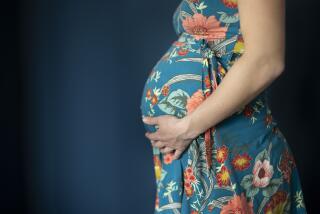Prenatal Care Can Help Prevent Preeclampsia
- Share via
There was a time--just a few decades ago--when pregnancy was considered relatively dangerous.
Today, because of improved medical care, a woman’s risk of serious complications or death during pregnancy and delivery is extremely low. Nevertheless, one serious problem continues to plague pregnant women and obstetricians: preeclampsia.
During the last decade, the rate of preeclampsia has increased by nearly one-third, and the condition currently affects about 8% of all pregnancies. In women with preeclampsia, arteries throughout the body constrict, narrowing the opening through which blood can flow and diminishing the blood supply to virtually all organs in the body, including the placenta and fetus. This narrowing of the vessels also causes blood pressure to rise, sometimes to dangerous levels.
These changes can lead to life-threatening complications. For the fetus, preeclampsia can result in abnormal growth and prematurity; for the mother, it can cause extensive damage to internal organs such as the kidneys, liver, lungs and brain.
In the most severe cases, the mother may develop liver or kidney failure, bleeding disorders or seizures that can lead to coma and death. Once seizures occur, the condition is referred to as eclampsia.
Women who are younger than 20, older than 40, overweight or carrying twins or triplets are more likely to develop preeclampsia, as are those with certain medical conditions, such as diabetes and high blood pressure.
The exact cause of preeclampsia is not known. At one time, it was believed that poisonous toxins in the pregnant woman’s blood were responsible (hence, the condition was called “toxemia of pregnancy”). However, no such toxins have been identified.
Simple blood pressure measurements and urinalyses provide the earliest and best clues that preeclampsia is developing. A diagnosis is made when significant elevations in blood pressure are detected after the 20th week of pregnancy and are accompanied by evidence of protein in the urine.
The “and” is important because not all pregnant women with high blood pressure have preeclampsia. Some suffer from chronic hypertension--their blood pressure was elevated before they became pregnant. (If their blood pressure was not measured before they became pregnant, it may be difficult at first to determine if they have preeclampsia.)
Other women have high blood pressure readings during pregnancy because of gestational hypertension. In these women, blood pressure rises during pregnancy, but there is typically no protein detected in the urine. And, unlike preeclampsia, gestational hypertension usually is not associated with any significant complications for either the fetus or the mother.
The treatment of preeclampsia is based on several factors, including the severity of the disease and the age of the fetus. The problem is “cured” by delivering the baby, although this is not practical if the fetus is premature and the mother’s health is not in immediate jeopardy. Therefore, mild preeclampsia is often managed with bed rest and medications to lower blood pressure. Because preeclampsia can deteriorate quickly, close monitoring of the mother and fetus are necessary throughout the remainder of the pregnancy.
In more severe cases, premature delivery of the baby is sometimes warranted. Evidence that the fetus is failing to grow properly or that the mother’s kidney or liver function is deteriorating, for example, may prompt immediate delivery. Except for early delivery, there is little evidence to suggest that the current medical treatments for preeclampsia are effective.
The best thing a woman can do to protect herself against preeclampsia and eclampsia is to get prenatal care. A recent study found that women who receive no prenatal care are more than seven times as likely to die from complications of preeclampsia and eclampsia as women who receive any prenatal care.
*
Dr. Jonathan Fielding is the director of public health and the health officer for the Los Angeles County Department of Health Services. Dr. Valerie Ulene is a board-certified specialist in preventive medicine practicing in Los Angeles. Their column appears the second and fourth Mondays of the month. Send questions by e-mail to ourhealth@dhs.co.la.ca.us. They cannot respond to every query.




